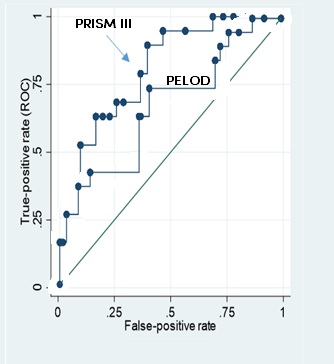Comparación de las escalas de mortalidad Pediatric Risk of Mortality (PRISM) y Pediatric Logistic Organ Dysfunction (PELOD) en pacientes pediátricos en una unidad de cuidados intensivos: Un estudio de centro único Artículo Original
Contenido principal del artículo
Resumen
Introducción: El objetivo del presente estudio fue realizar un estudio de pruebas diagnósticas entre la escala PRISM III vs la escala PELOD para predecir mortalidad en pacientes que ingresan a la Unidad de Cuidados Intensivos (UCIP) del Hospital Pediátrico Baca Ortiz en el periodo de junio-diciembre 2019.
Métodos: En el presente estudio observacional, retrospectivo, se registró la mortalidad y las variables que conforman cada una de las escalas predictivas. Se aplicó estadística descriptiva e inferencial, cálculo del área bajo la curva de ROC. La calibración, se calculó usando el chi2 de Hosmer Lemeshow y la tasa de mortalidad estandarizada mediante le paquete estadístico STATA v16.
Resultados: Ingresaron al estudio 150 pacientes. 99 pacientes (66%) fueron hombres, tuvieron una media de edad de 3 años (P25 a P75) de 1 mes a 14 años. La patología de ingreso más frecuente fue la enfermedad posquirúrgica en 43 pacientes (28.6%), y la insuficiencia respiratoria en 31 pacientes (21.6%). La mortalidad fue 12.7%, con una media de estancia hospitalaria de 5 días (1 a 60). La escala de PRIMS III con área bajo la curva de 0.80 (IC 95% de 0.70 a 0.90), sensibilidad 79 % y especificidad 63 % con un puntaje PRISM III de 13 puntos. La escala de PELOD con área bajo la curva de 0.7 (IC 95% de 0.5 a 0.80), sensibilidad de 79 % y especificidad de 60 % con un puntaje PELOD de 21 puntos.
Conclusiones: la escala de PRISM III predice la mortalidad mejor que la escala PELOD en este grupo de pacientes pediátricos en las primeras 24 horas.
Descargas
Detalles del artículo

Esta obra está bajo una licencia internacional Creative Commons Atribución-NoComercial-CompartirIgual 4.0.

